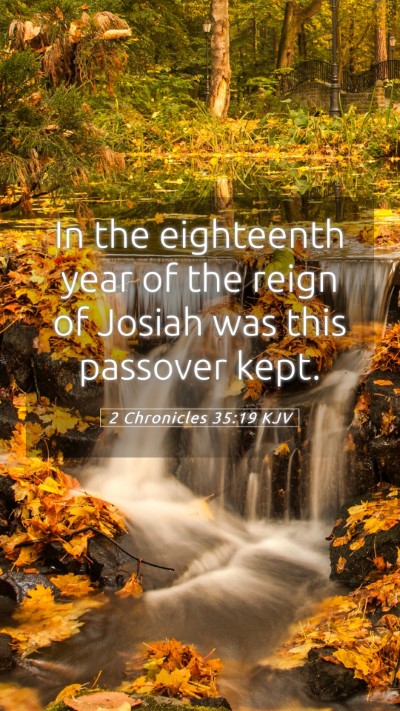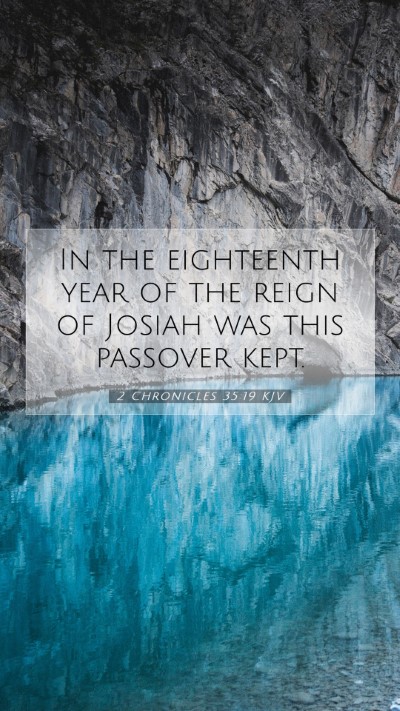Bible Verse Meaning of 2 Chronicles 35:19
Verse Text: "There was no Passover like to that kept in Israel from the days of Samuel the prophet; neither did all the kings of Israel keep such a Passover as Josiah kept, and the priests, and the Levites, and all Judah and Israel that were present, and the inhabitants of Jerusalem." (2 Chronicles 35:19)
Introduction to 2 Chronicles 35:19
This verse stands out in the history of Israel’s religious practices, highlighting the significance of King Josiah's celebration of the Passover. It emphasizes the uniqueness of this event in the annals of Israel’s worship. The Passover commemorates Israel's exodus from Egypt, serving as a vital component of Jewish identity and faith.
Bible Verse Interpretations
Understanding the Text: The context of 2 Chronicles 35 depicts King Josiah restoring the worship of Yahweh after a period of apostasy. This verse marks a culmination of his reforms, underlining the magnitude of the Passover he presided over.
- Matthew Henry's Commentary:
Henry points out that this Passover was distinguished not only by its scale but also by its devotion and sanctity. It was marked by unity among the people of Judah and Israel, embracing a collective return to worship.
- Albert Barnes' Commentary:
Barnes emphasizes the phrase “no Passover like that” to indicate the unparalleled nature of Josiah's observance. He asserts that the day encapsulated a spiritual revival and return to God’s covenant, contrasting with previous neglect.
- Adam Clarke's Commentary:
Clarke discusses the cultural and historical implications, noting that this restoration aligned with the prophetic call for holiness. The gathering included not only priests and Levites but also commoners, illustrating a national effort towards repentant worship.
Key Themes from the Verse
- Significance of the Passover:
The Passover is a reminder of God’s deliverance and a call to remembrance of His mighty works.
- Unity in Worship:
This event exemplified a collective commitment to worship, with all factions of Israel participating, whereas prior observances had often been marred by division.
- Spiritual Renewal:
Josiah’s Passover symbolizes a broader theme of spiritual revival—a return to covenant faithfulness after a season of idolatry.
Historical Context
This Passover celebration occurred amidst significant religious reforms initiated by King Josiah, who, according to other parts of Scripture, sought to eradicate pagan worship and restore the temple. This context is crucial for a thorough Bible study understanding of this verse.
Related Cross References
- Exodus 12:1-13: Establishes the original institution of the Passover.
- 2 Kings 23:21-23: Further details on Josiah's reforms and the setting of this remarkable celebration.
- Deuteronomy 16:1-8: Commands concerning the observance of the Passover, underscoring its importance.
Bible Study Insights
In studying 2 Chronicles 35:19, one may ponder the extent to which personal and communal contexts influence the observance of sacred traditions like the Passover. This verse invites reflection on how modern believers can engage in similar acts of worship and remembrance, stressing the importance of unity and fidelity to God's commands in contemporary Bible study groups.
Application of the Verse
Josiah's actions can inspire individual and community practices today, emphasizing adherence to spiritual commitments through public worship and participation in rituals that promote faith and devotion.
As you explore the meaning of Bible verses such as this one, consider how to incorporate these principles into daily life. Engaging with the scriptural text in online Bible study or discussion groups may facilitate a deeper understanding.
Conclusion
2 Chronicles 35:19 offers profound insights into the nature of worship, spiritual renewal, and community. In reflecting on this passage, readers can better grasp its implications for modern faith practices and the importance of remembering God's deeds throughout history.


